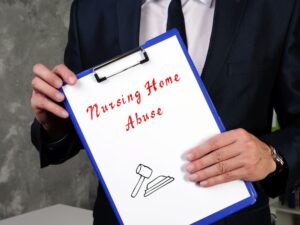When you place a loved one in a nursing home or long-term care facility, you expect them to be treated with the utmost care, respect, and dignity. These facilities are meant to provide a safe environment for elderly individuals who need assistance with daily activities due to age, illness, or disability.
Unfortunately, nursing home abuse and neglect are a growing concern across the country, including here in Missouri. Every year, thousands of families are devastated to discover that their loved ones have been mistreated or harmed while under the care of nursing home staff.
If you suspect that a family member has been a victim of nursing home abuse, it’s crucial to understand your rights and the legal options available to you. A medical malpractice lawyer can help you navigate the complexities of these cases.
This article will guide you through the process of filing a nursing home abuse lawsuit, detailing the types of abuse that can occur, how to recognize signs of abuse, the steps to protect your loved one, and the legal procedures involved in filing a lawsuit in Missouri.
What Is Nursing Home Abuse?
Nursing home abuse can take several forms, each with serious consequences for the victim.
Your lawyer can identify the different types of abuse, as each requires a different approach to handling and investigating.
- Physical Abuse: This includes hitting, slapping, pushing, or any other form of physical violence that causes harm or injury to the resident. Unexplained bruises, cuts, fractures, or other injuries often accompany it.
- Emotional or Psychological Abuse: This type of abuse can be just as damaging as physical abuse. It involves verbal assaults, threats, humiliation, intimidation, or other behaviors meant to cause emotional harm. Victims may exhibit signs of depression, anxiety, fear, or agitation.
- Sexual Abuse: Any form of non-consensual sexual activity, whether physical or verbal, falls under this category. Unfortunately, sexual abuse in nursing homes is often underreported because of the vulnerable state of many residents, particularly those with dementia or other cognitive impairments.
- Financial Exploitation: In some cases, caregivers or other staff members take advantage of elderly residents’ financial resources, either by stealing money, forging signatures, or coercing residents into making financial decisions that are not in their best interest.
- Neglect: Neglect occurs when nursing home staff fail to provide necessary care, including feeding, bathing, administering medications, or helping residents with daily activities. This can lead to malnutrition, dehydration, untreated medical conditions, and poor hygiene. Untreated bedsores or pressure ulcers are common signs of neglect.
- Abandonment: Abandonment occurs when a caregiver leaves a vulnerable resident without supervision or adequate care. It can happen in emergencies or when the caregiver simply neglects their responsibilities.
Each of these forms of abuse violates a resident’s rights. While a dispute over medical treatment or care may be a legitimate concern, any behavior that intentionally harms the resident or deprives them of necessary care should be taken seriously.
Recognizing the Signs of Nursing Home Abuse
Watch for physical and behavioral signs indicating something is wrong.
Physical Signs:
- Unexplained bruises, cuts, burns, or fractures.
- Bedsores or pressure ulcers that are not being treated.
- Sudden weight loss or malnutrition.
- Poor personal hygiene, such as dirty clothes or unwashed hair.
- Dehydration or untreated medical conditions.
Behavioral Signs:
- Fear or anxiety around certain staff members.
- Withdrawal from social activities or visitors.
- Sudden changes in mood, such as increased agitation or depression.
- Reluctance to speak about their care or living conditions.
- Emotional distress, such as crying or screaming, for no apparent reason.
Psychological and Emotional Indicators:
- Signs of depression, such as loss of interest in activities they once enjoyed.
- Fear or trauma-related behavior, including a heightened sense of alarm when a caregiver is near.
- A sudden decline in cognitive function or memory, which may be a sign of emotional stress or trauma.
Financial Signs:
- Missing money or valuables.
- Unexplained withdrawals from a resident’s bank account or credit card.
- Unusual changes to a resident’s will or financial documents.
If you notice any of these signs, take immediate action to investigate further. This could involve discussing your concerns with the nursing home administration, filing a complaint with the state, and, if necessary, consulting an attorney to explore legal options.
Missouri Nursing Home Laws and Regulations
In Missouri, state and federal regulations govern nursing homes and long-term care facilities that ensure residents are treated with dignity and receive appropriate care.
The Missouri Department of Health and Senior Services (DHSS) regulates and inspects nursing homes. Adult Protective Services (APS) investigates reports of abuse or neglect involving elderly adults, including those in nursing homes.
Missouri residents are protected by the Missouri Nursing Home Care Act, which mandates that nursing homes must provide care in a safe environment free from abuse, neglect, and mistreatment.
If a nursing home fails to meet these standards, the facility could face penalties, and the responsible individuals may be held accountable.
In addition to state regulations, nursing homes must comply with federal standards set forth by the Centers for Medicare & Medicaid Services (CMS), which oversees facilities that accept Medicare and Medicaid payments. These federal regulations are designed to ensure that nursing homes provide adequate care and protect residents from abuse.
Furthermore, Missouri residents have access to the Missouri Long-Term Care Ombudsman Program, which advocates for residents in nursing homes and other long-term care facilities.
Ombudsmen can investigate complaints, mediate disputes, and protect residents’ rights.
Legal Process for Filing a Nursing Home Abuse Lawsuit
If you believe your loved one has suffered abuse or neglect in a nursing home:
- Investigate and Document the Abuse: The first step is to gather as much evidence as possible. This includes medical records, photographs of injuries, witness statements, and other documentation supporting your claims. If your loved one cannot speak for themselves, other residents, visitors, or staff may provide information about the situation.
- Report the Abuse: Notify the nursing home administration about the abuse or neglect. File a formal complaint with the Missouri Department of Health and Senior Services and consider contacting Adult Protective Services (APS). If the abuse is severe or criminal in nature, report the situation to local law enforcement.
- Consult with an Attorney: While handling a nursing home abuse case without legal representation is possible, an attorney can help ensure your case is handled correctly. An experienced attorney will investigate the abuse, gather evidence, and navigate the complexities of Missouri law to help you seek compensation for your loved one.
- File the Lawsuit: Once you have gathered sufficient evidence, your attorney will file a lawsuit against the responsible parties. This may include the nursing home, its staff, or other individuals involved in the abuse or neglect.
- Statute of Limitations: The statute of limitations for nursing home claims varies because the basis for these claims can be negligence, intentional abuse, medical malpractice or wrongful death. Many nursing home cases are classified as medical malpractice because of the status of nursing homes as health care providers. The statute of limitations for such claims is only two years. If you think you have a case you should consult an attorney immediately so the proper statute of limitations can be determined. Prudence often dictates that nursing home cases be filed within two years so that there is no question of whether the claim has been timely filed. Additionally, it’s important to act quickly, as delays can make it more difficult to gather evidence and pursue a successful case.
Common Types of Compensation in Nursing Home Abuse Lawsuits
When filing a nursing home abuse lawsuit, you may recover compensation:
- Economic Damages: These compensate for financial losses, such as medical expenses, rehabilitation costs, and funeral expenses (if the abuse led to the victim’s death). Economic damages can also cover lost income for a caregiver who has to take time off work to care for the victim.
- Non-Economic Damages: These damages compensate for intangible losses, such as pain and suffering, emotional distress, loss of companionship, and a diminished quality of life. Non-economic damages can be particularly important in cases of emotional or psychological abuse, where the harm is not always visible.
- Punitive Damages: In cases of gross negligence or intentional harm, the court may award punitive damages to punish the defendant and deter others from similar behavior. These damages are typically awarded for the defendant’s particularly egregious actions.
Seeking compensation can hold the responsible parties accountable and help cover the costs of care, treatment, and emotional healing for the victim and their family.
Choosing the Right Attorney for Your Nursing Home Abuse Case
You need an attorney who understands the intricacies of Missouri law and the specific challenges involved in these types of cases.
An experienced attorney will:
- Conduct a thorough investigation into the abuse.
- Collect evidence, including medical records, witness statements, and expert testimony.
- Handle negotiations with the nursing home and its insurance company.
- Represent your interests in court, if necessary.
At Cook, Barkett, Ponder & Wolz, we are committed to helping victims of nursing home abuse in Missouri seek justice. We understand the emotional toll these cases take on families, and we are here to provide support throughout the entire legal process.
How Long Does the Legal Process Take?
The timeline for a nursing home abuse case can vary. Some cases may be resolved in months, while others may take years if they go to trial. Factors such as the case’s complexity, the number of parties involved, and the availability of evidence can all impact the duration.
Act as soon as possible to gather evidence and file your lawsuit. Delays can make it harder to build a strong case and may cause key witnesses to become unavailable.
The Impact of Nursing Home Abuse Lawsuits on Nursing Homes and Residents
Nursing home abuse lawsuits not only help victims and their families seek justice, but they can also lead to improvements in the long-term care industry as a whole.
When nursing homes are held accountable for poor practices, it sends a message that abuse and neglect will not be tolerated. Lawsuits can result in higher standards of care, better staffing, and more stringent regulations, ultimately improving conditions for all residents.
Frequently Asked Questions (FAQs)
1. What are the signs of nursing home abuse?
Signs of nursing home abuse can include unexplained bruises, cuts, or fractures; sudden changes in behavior (like anxiety or withdrawal); poor personal hygiene; weight loss or malnutrition; and financial irregularities.
Emotional or psychological abuse might show up as fear of certain staff members, agitation, or depression. If you notice any of these signs, taking action and investigating further is important.
2. What should I do if I suspect nursing home abuse?
If you suspect abuse, document any signs, report your concerns to the nursing home administration, and file a formal complaint with the Missouri Department of Health and Senior Services (DHSS) or Adult Protective Services (APS). If necessary, contact law enforcement, and consult an attorney to discuss your legal options.
3. How do I file a nursing home abuse lawsuit in Missouri?
To file a nursing home abuse lawsuit in Missouri, you’ll need to gather evidence, such as medical records, witness statements, and photographs of any injuries.
Report the abuse to the proper authorities, including the nursing home and state agencies, and then consult an attorney to help you file a lawsuit against the responsible parties.
Contact Us for a Free Case Evaluation
Nursing home abuse is a serious issue that affects many families in Missouri, so take immediate action if you suspect someone is harming your loved one. By understanding the types of abuse, recognizing the signs, and taking the right legal steps, you can help ensure that your family member receives the justice they deserve. A personal injury lawyer can assist you in navigating the legal process and help you pursue the compensation your loved one is entitled to.
At Cook, Barkett, Ponder & Wolz, we are here to help guide you through the legal process and advocate for your loved one’s rights. If you believe anyone has harmed your family member in a nursing home abuse, contact us today at (573) 335-6651 for your free consultation. Your loved one’s safety and dignity are worth fighting for.







